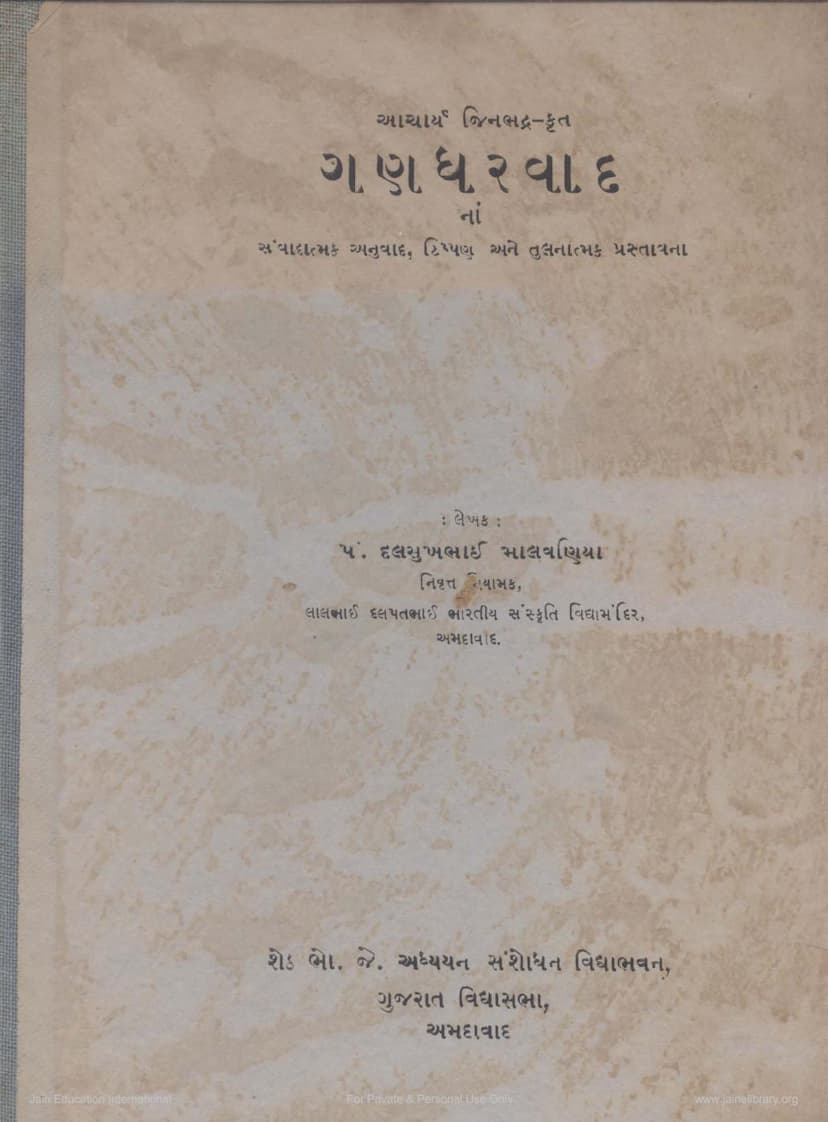Gandharwad
Added to library: September 1, 2025

Summary
Here's a comprehensive summary of the Jain text "Gandharvad" by Dalsukh Malvania, based on the provided information:
Book Title: Gandharvad (ગણધરવાદ) Author: Acharya Jinvira Gnani Kshamasramana (આચાર્ય જિનભદ્ર ગણી ક્ષમાશ્રમણ) Translator, Annotator, and Comparative Introduction Author: Pt. Dalsukh Malvania (પૂ. દલસુખભાઈ માલવણિયા) Publisher: B. J. Institute (B J Institute) Catalog Link: https://jainqq.org/explore/005245/1
Overview:
"Gandharvad" is a seminal Jain text that presents a detailed philosophical discussion on various aspects of Jain philosophy, particularly focusing on the existence and nature of the soul (Jiva), the concept of karma, the afterlife (paralok), and the nature of liberation (nirvana). The text is an elaboration and translation of a specific chapter titled "Gandharvad" from Acharya Jinvira Gnani Kshamasramana's extensive commentary on the Vishēshāvaśyak Bhāṣya.
Translator and Scholar:
The book is notable for its Gujarati translation, annotation, and comparative introduction by Pandit Dalsukh Malvania. Malvania, a renowned scholar of Jain philosophy and logic, meticulously translated the original Sanskrit work, providing detailed commentary and analysis. His work aims to make this complex philosophical treatise accessible to a wider audience, especially the Jain community and scholars of Indian philosophy.
Context and Origin:
The "Gandharvad" chapter itself originates from Acharya Jinvira Gnani Kshamasramana's Vishēshāvaśyak Bhāṣya, which is a commentary on the Āvaśyak Sūtra, a foundational text in Jainism dealing with daily religious duties. The Vishēshāvaśyak Bhāṣya is known for its comprehensive discussion on Jain tenets, its analytical approach, and its engagement with other Indian philosophical traditions. The "Gandharvad" section specifically focuses on a dialogue between Lord Mahavir and his eleven principal disciples, the Gandharas, addressing their doubts and philosophical queries. This dialogue format makes the philosophical concepts more relatable and easier to understand.
Key Philosophical Discussions:
The "Gandharvad" and, by extension, Malvania's work, delves into profound philosophical questions debated within Indian traditions, including:
- The Existence and Nature of the Soul (Jiva): The text explores arguments for and against the soul's existence, its relation to the body, and its inherent nature as consciousness. It examines various philosophical perspectives on the soul, including those that might differ from Jain viewpoints.
- The Theory of Karma: A significant portion of the text is dedicated to understanding karma – its nature, types, the process of bondage, and its role in the cycle of birth and death. The discussion likely touches upon how karma binds the soul and the mechanisms for its liberation.
- The Afterlife (Paralok): The text addresses the concept of the afterlife, including the existence of heavens (devlok) and hells (narak), and the nature of beings in these realms, often from a Jain perspective and in comparison with other traditions.
- Liberation (Moksha/Nirvana): The ultimate goal in Jainism, liberation, is discussed in terms of its causes and nature. The text likely explains how the cessation of karma and the dissolution of bondage lead to the soul's attainment of its pure, omniscient, and blissful state.
- Critique of Other Philosophical Systems: Consistent with the scholarly tradition of the time, Acharya Jinvira's work, and thus Malvania's translation, likely engages with and refutes opposing philosophical views prevalent up to the 7th century CE, including those of Charvaka, Buddhism, and various Vedic schools of thought. This comparative and critical approach highlights the unique aspects of Jain philosophy.
Translation and Scholarly Contribution:
Pandit Dalsukh Malvania's contribution is significant in several ways:
- Gujarati Translation: He provided a fluent and accurate Gujarati translation of the original Sanskrit commentary.
- Annotations (Tippan): His detailed annotations clarify complex philosophical terms, trace the origins of ideas, and offer comparative insights into related concepts in other Indian philosophical systems.
- Comparative Introduction: The introduction likely contextualizes the "Gandharvad" within the broader Jain canon, introduces Acharya Jinvira, and discusses the philosophical landscape of ancient India, setting the stage for the text's discussions.
- Scholarly Rigor: Malvania's work reflects extensive research, referencing various ancient Jain texts and traditions, and demonstrating a deep understanding of both Jain and other Indian philosophical schools.
Significance of the Work:
"Gandharvad" is considered a vital text for understanding the core philosophical tenets of Jainism. Acharya Jinvira's commentary is a foundational work for later Jain scholars, and Malvania's translation and commentary make this profound knowledge accessible to contemporary readers, contributing significantly to Jainological studies and the propagation of Jain philosophy. The book is highly regarded by the scholarly community and the Jain community for its depth, clarity, and the author's expertise. The republication of the second edition indicates its enduring value and demand.